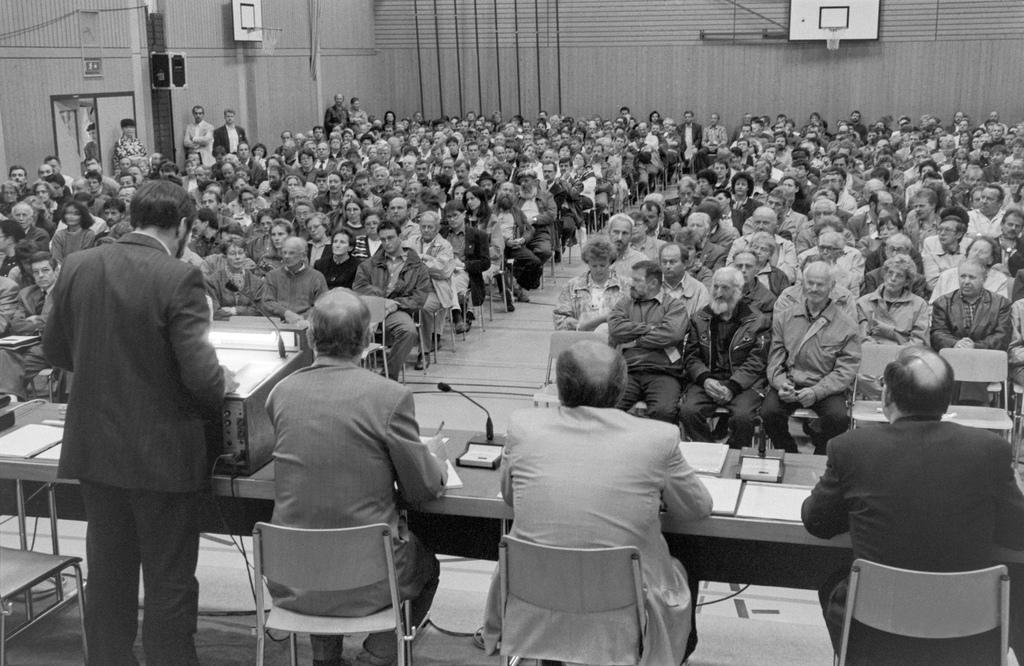Why a report could help improve civic education

How far should governments go to ensure voters have the knowledge to make informed decisions at the ballot box?
During a short discussion in parliament last week, Senator Andrea Caroni from canton Appenzell Outer Rhodes called on the government to provide an overview of efforts to promote civic education.
Caroni said it was vital to have informed and active citizens since – due to Swiss-style direct democracy – they are called upon several times a year to vote on a wide range of issues. His request was backed by several other members.
The education minister, Johann Schneider-Ammann, agreed in principle but he voiced reservations on behalf of the cabinet about the need to produce more reports and analysis.
“I hear the message loud and clear, alas, I lack the financial means,” he said, varying a phrase by a famous German author and statesman.
He said a lot was already being done, referring to organisations and educational projects which receive financial support from the government, including youth assemblies, online information portals and brochures.
Caroni for his part dismissed the funding argument, saying it would pay to have a clear idea where improvements could be made.

swissinfo.ch: Is a list really necessary, since it is largely known what is done in schools at the cantonal level, and elsewhere by the federal authorities?
Andrea Caroni: The government has provided several sectoral surveys about what is taught at schools at different levels. But we lack a national overview, so we see whether the money is spent twice on the same effort, for instance, or how it could be spent better.
swissinfo.ch: Where do you expect to find shortcomings?
A.C.: Civic education for adults could be one of the areas where more needs to be done. Particularly for people who didn’t have the chance to grow up in an environment where people discuss politics at home or learn about it at school like in Switzerland.
swissinfo.ch: What will happen once the report has been compiled?
A.C.: The parliamentary committee in charge will read it and discuss it. Then we will see what needs to be done to improve civic education. It could also emerge that no measures are necessary. I can’t yet exclude this option.
What impact did the previous six parliamentary calls over the past four years have?
Average turnout in nationwide votes over the past few years was about 45%, while around 48% took part in parliamentary elections over the past decade.
It is rare for an issue to attract more than 60% of the 5.2 million eligible Swiss voters to ballot box.
However, a study by Geneva University showed that about nine out of ten Swiss citizens take part in votes and elections sporadically.
A.C.: The government has taken many measures in the past, some of which might have been based on insights from surveys demanded by parliament.
But most parliamentary calls were rejected with the government saying there was no need for another report. This is why a general overview is needed which covers all partial surveys.
swissinfo.ch: Turning to your personal history. When and how did you get interested in politics?
A.C.: It wasn’t a particular issue that politicised me. In my case, it was rather a general interest in debating and taking part in public issues. A crucial moment for me was when a history teacher made me take part in a debate at school about the abolition of the traditional open air assembly, the Landsgemeinde. I enjoyed the discussions and the arguments.
Later we even came to visit the parliament building here in Bern and we met the Appenzell Outer Rhodes Senator at the time – little did I know that one day I’d be one his successors.
swissinfo.ch: Where there any role models in the family?
A.C.: Since I was a teenager, I have had political discussions with my father who shares my political convictions. But he has never been active in politics although he always takes part in votes and elections. Later on, my mother was a local judge. My father is still one of my main sparring partners for political ideas, and so is my mother’s partner.
I’m on a mission of sorts to get my whole family involved in politics. (laughs).
swissinfo.ch: What’s the best way for a young citizen to engage in politics?
A.C.: There is no school, of course, that you need to attend to become active in politics. I often tell pupils who come to visit parliament to get involved with youth assemblies or the youth session here in Bern.
My advice to young people is to wait before joining a political party, because they might take time to find the political group that really suits them. Otherwise, they jump from one party to the next and lose credibility.
swissinfo.ch: Should citizens be asked to participate more, possibly even making it a civic duty as a think tank suggested a few years ago?
A.C.: I’m very much against imposing duties on citizens, be it mandatory voting or else. Government interference should be kept to a minimum. Political rights include the right to abstain.
Ideally, people get their inspiration to become active citizens of their own free will.

In compliance with the JTI standards
More: SWI swissinfo.ch certified by the Journalism Trust Initiative














You can find an overview of ongoing debates with our journalists here . Please join us!
If you want to start a conversation about a topic raised in this article or want to report factual errors, email us at english@swissinfo.ch.